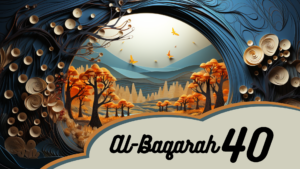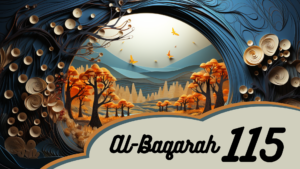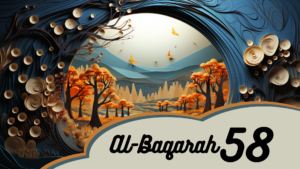In this article, we explore the meaning behind Verse 79 of Surah Al-Baqarah, delving into its significance and application in the daily lives of Muslims. By dissecting the verse and examining its context within the larger Surah Al-Baqarah, we aim to gain a deeper understanding of its intended message and how it relates to the lives of believers. Join us as we explore the profound wisdom contained within this verse and uncover the lessons it holds for us today.
Introduction
Surah Al-Baqarah, the second chapter of the Quran, holds great significance in the lives of Muslims around the world. It is the longest chapter in the Quran, consisting of 286 verses, and covers a wide range of topics including faith, law, morality, and guidance for personal and communal life. Within Surah Al-Baqarah, each verse carries its own meaning and message, contributing to the overall framework of the chapter.
In this article, we will delve into the meaning and significance of Verse 79 of Surah Al-Baqarah. We will explore its context within the chapter, decipher its translation, delve into the Arabic terminology used, and analyze its theological and religious implications. Furthermore, we will examine how this verse can be applied in our daily lives, both on an individual and communal level. In addition, we will explore the connections this verse has with other verses within Surah Al-Baqarah and discuss the interpretations provided by scholars throughout history. Finally, we will consider the relevance of Verse 79 in the contemporary context and address the challenges and solutions associated with its application.
Overview of Surah Al-Baqarah
Introduction to Surah Al-Baqarah
Surah Al-Baqarah is a pivotal chapter within the Quran, known for its comprehensive coverage of essential religious teachings and guidance. It addresses a multitude of topics, including the stories of past nations, the importance of prayer and charity, the role of the Prophet Muhammad as a leader, and the establishment of a just and ethical social order. Its content encompasses narratives, legal injunctions, and moral guidance, aiming to provide Muslims with a holistic understanding of their faith.
Importance of Surah Al-Baqarah
Surah Al-Baqarah holds immense importance for Muslims due to its comprehensive nature and wide-ranging topics. It serves as a guidebook for believers, offering detailed instructions on various aspects of life, including individual conduct, family matters, business ethics, and governance. The chapter’s teachings provide Muslims with a framework to navigate the complexities of the world while adhering to their faith. It is, therefore, considered essential for Muslims to study, reflect upon, and implement the teachings of Surah Al-Baqarah in their lives.
Context of Verse 79
Placement of Verse 79 within Surah Al-Baqarah
Verse 79 is located in the latter part of Surah Al-Baqarah, specifically within the context of addressing the Children of Israel. The preceding verses discuss the challenges faced by the Israelites, such as their disobedience to God’s commandments and their rejection of Prophets sent to guide them. This verse serves as a response from the Children of Israel, prompting a deeper examination of their attitude toward divine guidance and the consequences of their actions.
Historical Context
The historical context of Verse 79 revolves around the interaction between the Children of Israel and the Prophet Moses. The Israelites were a chosen nation, blessed with various miracles and divine guidance. However, despite these blessings, they deviated from the true path, engaging in idol worship and disregarding the teachings of their Prophets. This verse highlights their refusal to accept the truth and their inclination towards arrogance and disobedience.
Meaning of Verse 79
Translation of Verse 79
The translation of Verse 79 of Surah Al-Baqarah is as follows: “So woe to those who write the “scripture” with their own hands, then say, ‘This is from Allah ,’ in order to exchange it for a small price. Woe to them for what their hands have written and woe to them for what they earn.”
This verse serves as a cautionary message against those who alter or manipulate divine scriptures for personal gain or to misguide others. It warns individuals about the severe consequences that await those who distort the words of Allah, claiming them to be authentic revelations.
Exploring the Arabic Terminology
To fully grasp the meaning of Verse 79, it is essential to delve into the Arabic terminology used. The word “woe,” used twice in this verse, conveys a sense of impending doom or severe punishment. It emphasizes the gravity of the actions being admonished and serves as a powerful reminder of the consequences that await those who engage in such behavior. Additionally, the phrase “in order to exchange it for a small price” highlights the motivation behind the act of tampering with scripture – personal gain or material benefit. This phrase underscores the inherent greed and corruption involved in distorting divine revelations.
Understanding the Significance
Theological Significance of Verse 79
Verse 79 holds significant theological implications as it warns against altering or falsifying religious scriptures. This verse emphasizes the sanctity of divine revelations and the importance of preserving their integrity. It serves as a reminder that the true scriptures, as revealed by Allah, should not be manipulated for personal agendas or monetary gain. The verse underscores the accountability individuals will face in the afterlife for such actions, emphasizing the seriousness of tampering with divine guidance.
Religious Interpretations
Islamic scholars have provided various interpretations of Verse 79. Some scholars interpret the verse as a warning against the manipulation of the Torah, the holy scripture revealed to Moses. They believe this verse specifically addresses the Israelites’ alteration of their divine scripture to suit their desires and preferences. Others interpret the verse more broadly, encompassing the manipulation of any divine scripture, including the Quran. They emphasize the universal message of the verse, warning against any form of distortion or misinterpretation of religious texts.
Application in Daily Life
Application of Verse 79 in Personal Practices
Verse 79 has several applications in our daily lives as Muslims. It serves as a reminder to approach religious texts with sincerity, humility, and a commitment to truth. It admonishes against the temptation to twist or manipulate the meanings of scripture to suit personal preferences or gain. This verse encourages individuals to seek knowledge from authentic and reliable sources and to engage in contemplation and reflection upon the teachings of the Quran and other religious texts. It calls for adherence to the original message of divine revelations and discourages distorting the teachings to fit personal desires or biases.
Social and Community Impact
The application of Verse 79 extends beyond individual practices and has a significant impact on society and the community at large. It promotes the preservation of religious integrity, discouraging the propagation of false or modified teachings. By adhering to the principles outlined in this verse, Muslims foster an environment of trust, authenticity, and accuracy in the dissemination and transmission of religious knowledge. This verse serves as a safeguard against the exploitation of religion and ensures the continued preservation of the true message of Islam for future generations.
Connection with Other Verses
Relationship with Previous and Following Verses
Verse 79 acts as a continuation of the preceding verses, which highlight the disobedience and misguidance of the Children of Israel. It serves as a response to their refusal to accept and abide by divine commandments. Following Verse 79, Surah Al-Baqarah continues to address the Children of Israel’s neglect of their responsibilities and their failure to recognize and appreciate the blessings bestowed upon them. This ongoing narrative provides a comprehensive understanding of the Israelites’ relationship with Allah and its consequences.
Themes and Concepts
Verse 79 incorporates several prominent themes and concepts found throughout Surah Al-Baqarah. It highlights the importance of sincerity, humility, and honesty in matters of faith. It warns against the dangers of greed, manipulation, and personal gain in the realm of religion. The verse emphasizes the accountability of individuals, both in this world and the hereafter, for their actions and intentions. Additionally, it radiates the concept of divine justice, whereby individuals will face the consequences of their deeds in due time.
Interpretations by Scholars
Historical Commentary on Verse 79
Scholars throughout history have provided insightful commentary on Verse 79. They highlight the gravity of altering divine scriptures and the dire consequences that await those who engage in such practices. Many scholars reference historical instances where religious texts were manipulated or distorted to suit personal or political agendas, resulting in confusion, division, and the dilution of true religious teachings.
Different Perspectives
While there is a general consensus among scholars regarding the gravity and significance of Verse 79, there may be varying interpretations and perspectives regarding its broader implications. Some scholars emphasize the strict prohibition of any alteration or distortion of religious texts, applying it not only to the past but also to the contemporary context. Others may approach the verse from a more historical or contextual standpoint, focusing on the specific instance of the Israelites’ manipulation of the Torah.
Relevance in Contemporary Context
Relevance of Verse 79 in the Modern World
Verse 79 of Surah Al-Baqarah retains its relevance in the modern world due to the ongoing challenges of scriptural misinterpretation and manipulation. In an era of widespread access to information, individuals and groups may distort religious texts for personal or ideological gain. This verse serves as a reminder to approach religious scriptures with reverence and authenticity, seeking knowledge from reliable sources and promoting the preservation of religious integrity.
Challenges and Solutions
One of the challenges faced in the contemporary context is the proliferation of distorted interpretations and misrepresentations of religious texts. To mitigate this challenge, it is essential for individuals to seek knowledge from qualified and reputable scholars who adhere to the principles of sound exegesis and interpretive principles. Promoting interfaith dialogue and understanding can also help address misconceptions and misrepresentations of religious teachings, fostering a more harmonious and accurate understanding of one another’s faiths.
Conclusion
Verse 79 of Surah Al-Baqarah serves as a powerful reminder of the consequences of distorting or manipulating religious scriptures. It emphasizes the importance of preserving the integrity of divine revelations and warns against the motivations of personal gain or desires. The verse has theological, personal, and societal implications, guiding individuals in their daily lives and fostering a community built on authenticity and trust. By understanding and implementing the teachings of Verse 79, Muslims can guard the true essence of their faith and contribute to a more harmonious and enlightened world.




